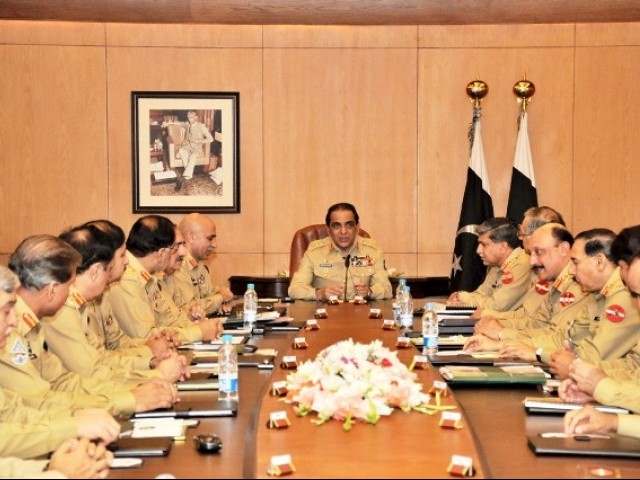
On Saturday 20th of July, the government of Pakistan announced it was contemplating on releasing a copy of the 336-page Abbottabad Commission Report on the country’s intelligence failures during the killing of Osama bin Laden. Despite government deliberations on whether to release the report or not, the leaked version has done irreparable damage to standing of the armed forces and to a lesser extent the civilian leadership.
The report paints a damning picture about the conduct of the government and the military over the past decade or so in their collective failure to detect Osama bin Laden. Extracts from the report such as “breath-taking incompetence and irresponsibility” and “culpable negligence and incompetence at almost all levels of government” is extremely critical of the civilian and military leadership. Nonetheless, it is the blame apportioned to the intelligence community that resonates most for many Pakistanis. The report states: “It is a glaring testimony to the collective incompetence and negligence, at the very least, of the security and intelligence community in the Abbottabad area”. Yet despite such glaring criticisms both the government and the military go about their business as if it is business as usual. Nothing epitomises this better than the current debate about who will succeed Ashfaq Parvez Kayani the current Chief of Army Staff (COAS) after he retires on November 28, 2013.
But before we address this topic the issue of culpability of Pakistan’s military leaders behind the Abbotabad fiasco has to be addressed. There are three principal figures that need to be tried for this humiliating event namely: Musharraf, his protégé Kayani and his accomplice Pasha. Musharraf is the principal architect behind the intelligence failures. He established the edifice for Pakistan’s co-operation with the Americans in 2001. This mainly consisted of Pakistani armed forces either looking the other way or being complicit with America, as she prosecuted her war on terror inside Pakistan with impunity. After Musharraf’s ouster from office, the mantle of subjugating Pakistani armed forces to America’s whim was given to the present COAS, Ashfaq Kayani (the former ISI Chief under Musharraf) who ostensibly appeared more enthusiastic than ever to help America entrench its tentacles deeper into Pakistan. During his tenure as COAS, Kayani was aided and abetted by the ISI Chief Shuja Pasha in making sure that the Pakistani army was unable to mount an effective response prior to, during and in the aftermath of the US forces raid into Abbotabad.
None of these principal culprits have been tried. The Abbottabad Commission cowardly shies away from holding the three responsible for any crimes committed against the Pakistani state. Not even the lesser charge of dismissing Kayani for gross incompetence gets a mention. Hence assertions in the report such as describing America’s Abbotabad operation as “act of war” or “a criminal act of murder” is no more than fiery rhetoric and a great diversion from the naked truth about the treachery committed by the three perpetrators.
Without bringing the three army leaders to justice, no one will ever know who else was involved in rendering the Pakistani armed forces ineffective and paralysed during the Abbotabad raid. This is very important and it brings me to the next point—who should be the next COAS. Nawaz Sharif has to find a replacement for Kayani when he retires from office in a few months. Nawaz Sharif should be weary. After all he was removed twice by Gen Waheed Kakar and Gen Pervez Musharraf during his two previous terms in office. At present three names that are being touted: Lt Gen Haroon Aslam, Lt Gen Rashad Mahmood and Lt. Gen Raheel Sharif. But we will never know what role—if any— these individuals played in supporting Musharraf, Kayani and Pasha in the Abbotabad debacle. More importantly, we will never know whether these candidates have supported or abstained from joining America’s war on terror, which includes: military operations into the tribal areas at the behest of the Americans, American drone strikes, the Raymond Davis affair, abduction of Aafia Siddiqui, and American attempts to undermine Pakistan’s nuclear weapons. The only significant factor in assessing their candidature appears to be how pro-American they are compared to their predecessors—all of whom have served their American masters with distinction. This then implies there will be no change in the mindset of the military leadership and it will continue its subservience to America. This will bring more misfortunes like the Abbotabad incident, spawn greater inquiries and reports, but will produce no substantive action to thwart the on-going humiliation suffered at the hands of Pax-Americana.
Some have sought to upend Pakistan’s close military ties to America, and instead of being treated as heroes are swiftly incarcerated and charged with treason. The case of Brigadier Ali is a noteworthy example. While this may seem an oddity in armed forces dominated by America, it does represent an emerging trend across the Muslim world and is not confined to the shores of Pakistan. Army officers have tried similar feats in Bangladesh, Egypt, Syria, Turkey etc. to break America’s stranglehold over their people but have not succeeded to date. Washington’s effort to seek out and promote pro-American officers ahead of others is a double edged sword. Adhering to such scripts means that governments and militaries throughout the Muslim world run the increasing risk of being toppled by anti-American officers whose loyalties lie with Islam and not with the West or her surrogates. For American analysts like Bruce Riedel and John R. Schmidt it is only a matter of time before this happens to Pakistan. This is what Riedel had to say: “We face the potential of a nuclear-armed state run by Islamic extremists.”
22 July 2013 CE
